仁爱版英语八年级下册 Unit 7 Topic 2 I’m not sure whether I can cook it well.Section C 课件 (共24张PPT)
文档属性
| 名称 | 仁爱版英语八年级下册 Unit 7 Topic 2 I’m not sure whether I can cook it well.Section C 课件 (共24张PPT) |  | |
| 格式 | pptx | ||
| 文件大小 | 25.6MB | ||
| 资源类型 | 教案 | ||
| 版本资源 | 仁爱科普版 | ||
| 科目 | 英语 | ||
| 更新时间 | 2023-05-24 12:55:49 | ||
图片预览

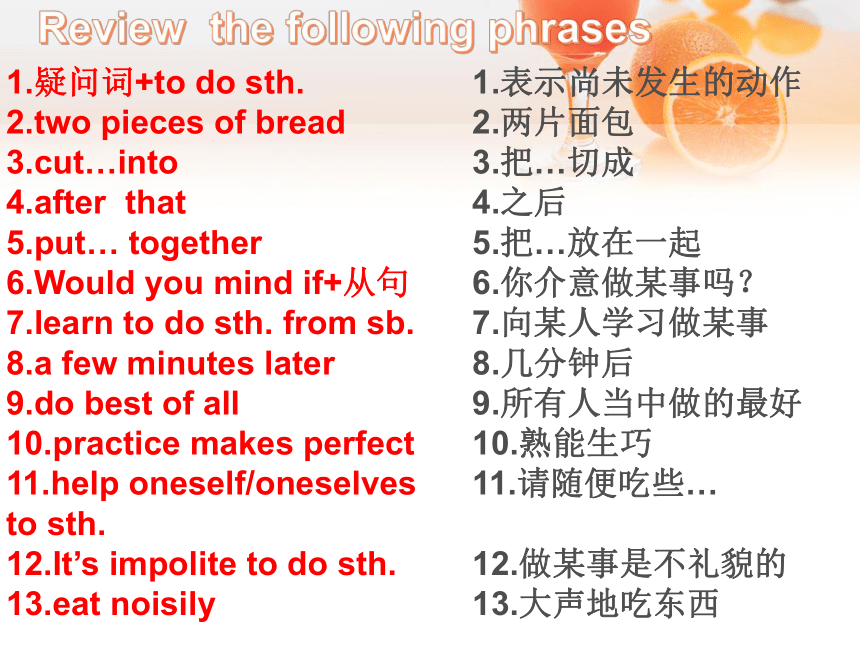
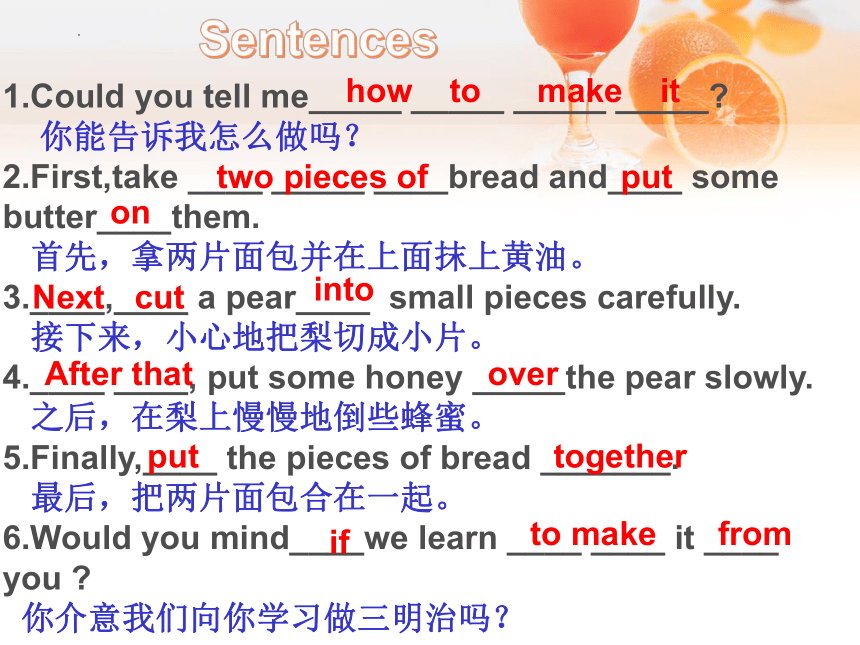
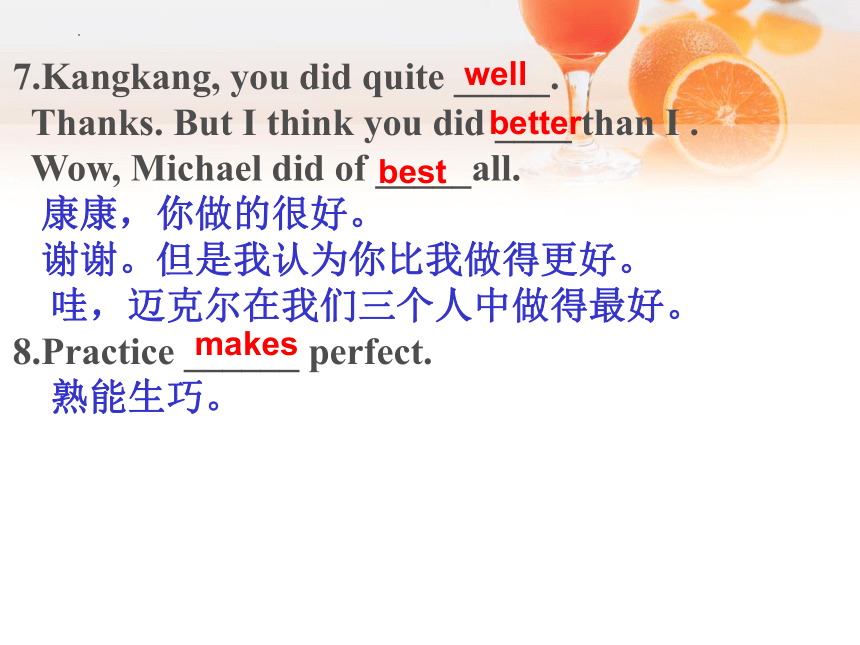

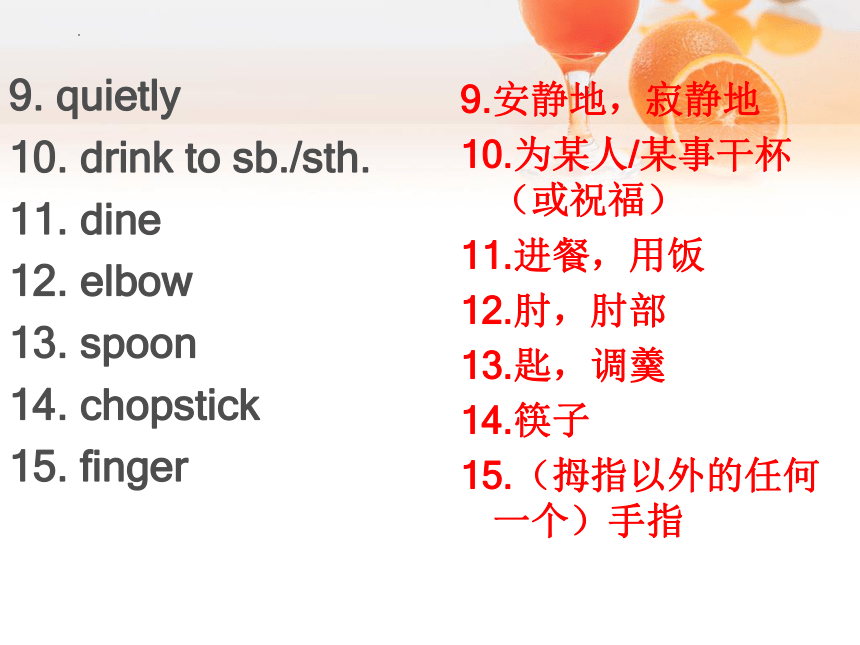
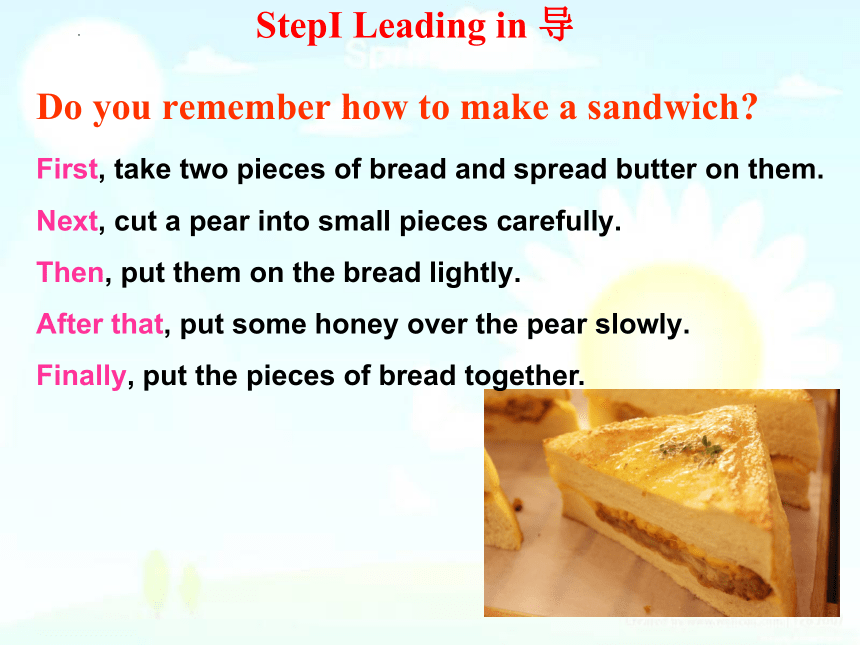
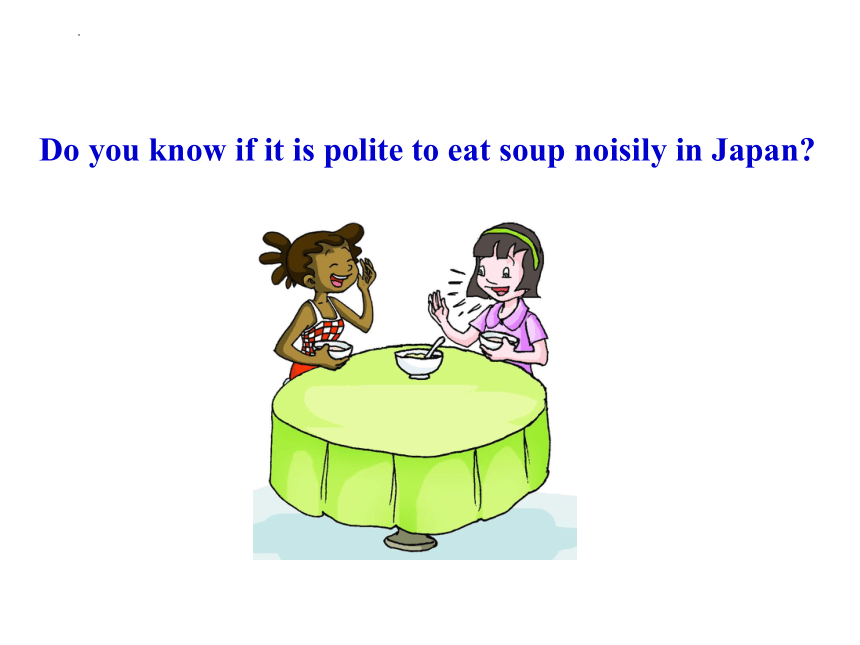
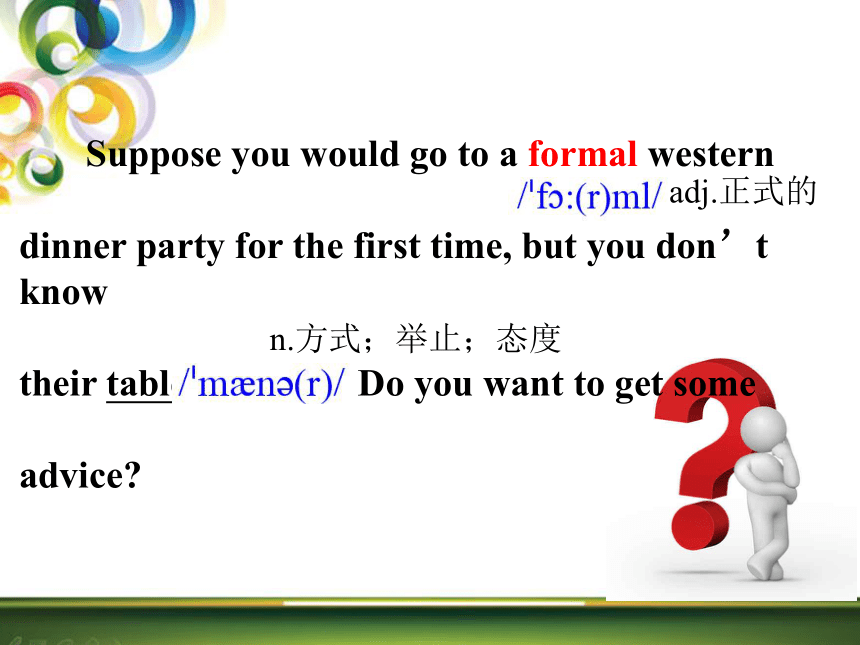
文档简介
(共24张PPT)
Unit 7 Food Festival
Topic 2 I’m not sure whether I can cook it well.
Section C
初二英语备课组
Review the following phrases
1.表示尚未发生的动作
2.两片面包
3.把…切成
4.之后
5.把…放在一起
6.你介意做某事吗?
7.向某人学习做某事
8.几分钟后
9.所有人当中做的最好
10.熟能生巧
11.请随便吃些…
12.做某事是不礼貌的
13.大声地吃东西
1.疑问词+to do sth.
2.two pieces of bread
3.cut…into
4.after that
5.put… together
6.Would you mind if+从句
7.learn to do sth. from sb.
8.a few minutes later
9.do best of all
10.practice makes perfect
11.help oneself/oneselves to sth.
12.It’s impolite to do sth.
13.eat noisily
Sentences
1.Could you tell me_____ _____ _____ _____
你能告诉我怎么做吗?
2.First,take ____ _____ ____bread and____ some butter____them.
首先,拿两片面包并在上面抹上黄油。
3.____,____ a pear____ small pieces carefully.
接下来,小心地把梨切成小片。
4.____ ____, put some honey _____the pear slowly.
之后,在梨上慢慢地倒些蜂蜜。
5.Finally,____ the pieces of bread _______.
最后,把两片面包合在一起。
6.Would you mind____we learn ____ ____ it ____ you
你介意我们向你学习做三明治吗?
how to make it
two pieces of
put
on
Next
cut
into
After that
over
put
together
if
to make
from
7.Kangkang, you did quite _____.
Thanks. But I think you did ____ than I .
Wow, Michael did of _____all.
康康,你做的很好。
谢谢。但是我认为你比我做得更好。
哇,迈克尔在我们三个人中做得最好。
8.Practice ______ perfect.
熟能生巧。
well
better
best
makes
New words
1.正式的
2.方式,举止,态度
3.餐桌礼节,用餐的规矩
4.餐巾
5.(人坐时)膝部
6.叉,餐叉
7.菜肴,碟,盘
8.吃光,吃完
1. formal
2. manner
3. table manners
4. napkin
5. lap
6. fork
7. dish
8. eat up
9.安静地,寂静地
10.为某人/某事干杯(或祝福)
11.进餐,用饭
12.肘,肘部
13.匙,调羹
14.筷子
15.(拇指以外的任何一个)手指
9. quietly
10. drink to sb./sth.
11. dine
12. elbow
13. spoon
14. chopstick
15. finger
Do you remember how to make a sandwich
First, take two pieces of bread and spread butter on them.
Next, cut a pear into small pieces carefully.
Then, put them on the bread lightly.
After that, put some honey over the pear slowly.
Finally, put the pieces of bread together.
StepⅠ Leading in 导
Do you know if it is polite to eat soup noisily in Japan
Suppose you would go to a formal western
dinner party for the first time, but you don’t know
their table manners. Do you want to get some
advice
adj.正式的
n.方式;举止;态度
A _______
B _______
C spoon
D _______
E _______
F _______
napkin
fork
plate
glass
knife
Look at the picture and write the words on the lines.
Read and understand.
1a
StepⅡ Thinking思
1.完成课本P67—P68的 1b,1c,和2。
2.大声读课本P67—P68,在书上划出重点短语。
3.大声读课本P67—P68,在书上划出重点句子。
StepⅢ Discussing议
StepⅣ Presenting 展
1b
1.When you start dining, you should take your napkin first and put it on your lap.
2.At the table, people always keep the fork in their left hands.
3.It’s impolite to eat up the food on your plate.
4.It’s polite to speak loudly and smile a lot.
5.When you drink to someone, you should raise your glass and take only a little.
Read 1a and mark T (True) or F(False).
( )
( )
( )
( )
( )
T
F
F
F
T
A: Can you tell me if it's polite to eat with your arms or elbows on the table in America
B: Yes, I can. It's impolite.
A: Do you know whether or not it's impolite to smoke during a meal in France
B: Yes, I do. It's impolite.
A: We know people use a spoon and a fork to eat in Thailand. Do you know whether they use knives
B: Yes, I do. They don't use them.
A:I know Indians eat with their right hands. I don‘t know if there’s no need for knives,forks or chopsticks.
B:No, there's no need.
Match the pictures with the conversations.Then practice in pairs.
2
n.肘,肘部
A
B
C
D
C
B
A
D
Discuss eating customs in different countries, using object clauses.
Example:
Is it polite to point at people with chopsticks in China
A:I want to know whether/if it is polite to point at people with
chopsticks in China.
B:I don't think that it is polite to point at people with chopsticks in China.
1.Is it polite to eat soup very quietly in most African countries
2.Can people smoke during a meal in France
3.Will people leave as soon as they finish eating in western countries
4.Do Americans eat food like chicken legs with their fingers
5.Does a formal western dinner always start with a small dish
3
n.手指
quiet+ly——quietly adv. 安静地,寂静地
point at sb.指向某人
finish doing sth. 完成某事
1.If you go to a formal western dinner party for the first time,you'd better know about western table manners.
(1) for the first time 第一次
E.g:2012年,我第一次到北京去度假。
I went to Beijing for my holiday in 2012 for the first time.
(2) table manners 餐桌礼仪
2.It's polite to eat up the food on your plate,...
eat up sth./eat sth. up 吃完,吃光
3.When you drink to someone,...
drink to sb./sth.为......干杯(祝酒)
4.Remember not to drink too much.
(1) remember to do sth.记得要做某事(事情还没有做)
否定形式为:remember not to do sth.
(2) too much 在句中作状语,修饰动词drink。
StepⅤ Explaining 评
1.第一次做某事
2.餐桌礼节
3.做某事是礼貌的/
不礼貌的
4.以…开始
5.吃光,吃完
6.是否
7.为某人/某事干杯
8.记得(不要)去做某事
9.喝太多
do sth for the first time
=It's first time to do sth
2.table manners
3.It’s polite/impolite to do sth.
4.start/begin with
5.eat up
6.whether …or not
7.drink to sb./sth.
8.remember (not) to do sth.
9.drink too much
1.If you go to a formal western dinner party for the first time, you’d better know about western table manners.
如果你第一次参加正式的西方宴会,做好了解一下西方的餐桌礼节。
2.It’s polite to eat up the food on your plate, so don’t take more food than you need.
吃完你盘子里的食物是礼貌的,因此别拿超过你需要的食物。
3.When you drink to someone, you’d better raise your cup or glass and take only a little.
当你向某人祝酒时,你最好举起杯子而且只喝一小口。
4. Remember not to drink too much.
记得不要喝太多。
5. Can you tell me if it’s polite to eat with your arms or elbows on the table in America
你能告诉我,在美国吃饭时用胳膊或肘部放在桌子上是否有礼貌吗?
把下列句子合并成一个含有宾语从句的复合句。
1. I don’t know. Is she a teacher
2. Do you know Is it good to watch TV
too much
3. I don’t know. Is it polite to eat up the
food on your plate
4. I’m not sure. Is he at home
5. I want to know. Will it rain tomorrow
StepⅤⅠ Checking检
Write a short passage about table manners in China, using object clauses and the information you have collected in 1c.
Project
Homework
1. Read 1a and retell it .
2. Collect more information about table manners
in different countries.
3.Finish Section C in your workbook.
4.Preview Section D.
Thank you !
Unit 7 Food Festival
Topic 2 I’m not sure whether I can cook it well.
Section C
初二英语备课组
Review the following phrases
1.表示尚未发生的动作
2.两片面包
3.把…切成
4.之后
5.把…放在一起
6.你介意做某事吗?
7.向某人学习做某事
8.几分钟后
9.所有人当中做的最好
10.熟能生巧
11.请随便吃些…
12.做某事是不礼貌的
13.大声地吃东西
1.疑问词+to do sth.
2.two pieces of bread
3.cut…into
4.after that
5.put… together
6.Would you mind if+从句
7.learn to do sth. from sb.
8.a few minutes later
9.do best of all
10.practice makes perfect
11.help oneself/oneselves to sth.
12.It’s impolite to do sth.
13.eat noisily
Sentences
1.Could you tell me_____ _____ _____ _____
你能告诉我怎么做吗?
2.First,take ____ _____ ____bread and____ some butter____them.
首先,拿两片面包并在上面抹上黄油。
3.____,____ a pear____ small pieces carefully.
接下来,小心地把梨切成小片。
4.____ ____, put some honey _____the pear slowly.
之后,在梨上慢慢地倒些蜂蜜。
5.Finally,____ the pieces of bread _______.
最后,把两片面包合在一起。
6.Would you mind____we learn ____ ____ it ____ you
你介意我们向你学习做三明治吗?
how to make it
two pieces of
put
on
Next
cut
into
After that
over
put
together
if
to make
from
7.Kangkang, you did quite _____.
Thanks. But I think you did ____ than I .
Wow, Michael did of _____all.
康康,你做的很好。
谢谢。但是我认为你比我做得更好。
哇,迈克尔在我们三个人中做得最好。
8.Practice ______ perfect.
熟能生巧。
well
better
best
makes
New words
1.正式的
2.方式,举止,态度
3.餐桌礼节,用餐的规矩
4.餐巾
5.(人坐时)膝部
6.叉,餐叉
7.菜肴,碟,盘
8.吃光,吃完
1. formal
2. manner
3. table manners
4. napkin
5. lap
6. fork
7. dish
8. eat up
9.安静地,寂静地
10.为某人/某事干杯(或祝福)
11.进餐,用饭
12.肘,肘部
13.匙,调羹
14.筷子
15.(拇指以外的任何一个)手指
9. quietly
10. drink to sb./sth.
11. dine
12. elbow
13. spoon
14. chopstick
15. finger
Do you remember how to make a sandwich
First, take two pieces of bread and spread butter on them.
Next, cut a pear into small pieces carefully.
Then, put them on the bread lightly.
After that, put some honey over the pear slowly.
Finally, put the pieces of bread together.
StepⅠ Leading in 导
Do you know if it is polite to eat soup noisily in Japan
Suppose you would go to a formal western
dinner party for the first time, but you don’t know
their table manners. Do you want to get some
advice
adj.正式的
n.方式;举止;态度
A _______
B _______
C spoon
D _______
E _______
F _______
napkin
fork
plate
glass
knife
Look at the picture and write the words on the lines.
Read and understand.
1a
StepⅡ Thinking思
1.完成课本P67—P68的 1b,1c,和2。
2.大声读课本P67—P68,在书上划出重点短语。
3.大声读课本P67—P68,在书上划出重点句子。
StepⅢ Discussing议
StepⅣ Presenting 展
1b
1.When you start dining, you should take your napkin first and put it on your lap.
2.At the table, people always keep the fork in their left hands.
3.It’s impolite to eat up the food on your plate.
4.It’s polite to speak loudly and smile a lot.
5.When you drink to someone, you should raise your glass and take only a little.
Read 1a and mark T (True) or F(False).
( )
( )
( )
( )
( )
T
F
F
F
T
A: Can you tell me if it's polite to eat with your arms or elbows on the table in America
B: Yes, I can. It's impolite.
A: Do you know whether or not it's impolite to smoke during a meal in France
B: Yes, I do. It's impolite.
A: We know people use a spoon and a fork to eat in Thailand. Do you know whether they use knives
B: Yes, I do. They don't use them.
A:I know Indians eat with their right hands. I don‘t know if there’s no need for knives,forks or chopsticks.
B:No, there's no need.
Match the pictures with the conversations.Then practice in pairs.
2
n.肘,肘部
A
B
C
D
C
B
A
D
Discuss eating customs in different countries, using object clauses.
Example:
Is it polite to point at people with chopsticks in China
A:I want to know whether/if it is polite to point at people with
chopsticks in China.
B:I don't think that it is polite to point at people with chopsticks in China.
1.Is it polite to eat soup very quietly in most African countries
2.Can people smoke during a meal in France
3.Will people leave as soon as they finish eating in western countries
4.Do Americans eat food like chicken legs with their fingers
5.Does a formal western dinner always start with a small dish
3
n.手指
quiet+ly——quietly adv. 安静地,寂静地
point at sb.指向某人
finish doing sth. 完成某事
1.If you go to a formal western dinner party for the first time,you'd better know about western table manners.
(1) for the first time 第一次
E.g:2012年,我第一次到北京去度假。
I went to Beijing for my holiday in 2012 for the first time.
(2) table manners 餐桌礼仪
2.It's polite to eat up the food on your plate,...
eat up sth./eat sth. up 吃完,吃光
3.When you drink to someone,...
drink to sb./sth.为......干杯(祝酒)
4.Remember not to drink too much.
(1) remember to do sth.记得要做某事(事情还没有做)
否定形式为:remember not to do sth.
(2) too much 在句中作状语,修饰动词drink。
StepⅤ Explaining 评
1.第一次做某事
2.餐桌礼节
3.做某事是礼貌的/
不礼貌的
4.以…开始
5.吃光,吃完
6.是否
7.为某人/某事干杯
8.记得(不要)去做某事
9.喝太多
do sth for the first time
=It's first time to do sth
2.table manners
3.It’s polite/impolite to do sth.
4.start/begin with
5.eat up
6.whether …or not
7.drink to sb./sth.
8.remember (not) to do sth.
9.drink too much
1.If you go to a formal western dinner party for the first time, you’d better know about western table manners.
如果你第一次参加正式的西方宴会,做好了解一下西方的餐桌礼节。
2.It’s polite to eat up the food on your plate, so don’t take more food than you need.
吃完你盘子里的食物是礼貌的,因此别拿超过你需要的食物。
3.When you drink to someone, you’d better raise your cup or glass and take only a little.
当你向某人祝酒时,你最好举起杯子而且只喝一小口。
4. Remember not to drink too much.
记得不要喝太多。
5. Can you tell me if it’s polite to eat with your arms or elbows on the table in America
你能告诉我,在美国吃饭时用胳膊或肘部放在桌子上是否有礼貌吗?
把下列句子合并成一个含有宾语从句的复合句。
1. I don’t know. Is she a teacher
2. Do you know Is it good to watch TV
too much
3. I don’t know. Is it polite to eat up the
food on your plate
4. I’m not sure. Is he at home
5. I want to know. Will it rain tomorrow
StepⅤⅠ Checking检
Write a short passage about table manners in China, using object clauses and the information you have collected in 1c.
Project
Homework
1. Read 1a and retell it .
2. Collect more information about table manners
in different countries.
3.Finish Section C in your workbook.
4.Preview Section D.
Thank you !
同课章节目录
- Unit 5 Feeling excited
- Topic 1 You look excited
- Topic 2 I’m feeling better now.
- Topic 3 Many things can affect our feelings.
- Unit 6 Enjoying Cycling
- Topic 1 We're going on a three-day visit to Mount
- Topic 2 How about exploring Tian’anmen Square?
- Topic 3 Bicycle riding is good exercise.
- Unit 7 Food festival
- Topic 1 We’re preparing for a food festival.
- Topic 2 I’m not sure whether I can cook it well.
- Topic 3 I Cooked the Most Successfully
- Unit 8 Our Clothes
- Topic 1 We will have a class fashion show.
- Topic 2 We can design our own uniforms.
- Topic 3 He said the fashion show was wonderful.
